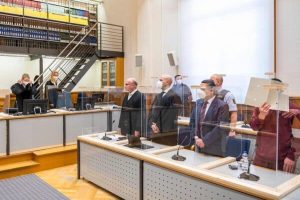By: Lauren Della Stua
Impunity Watch Staff Writer
KOBLENZ, Germany – On February 24, 2021, in the first case of its kind, a German court sentenced a Syrian intelligence officer to four and a half years imprisonment for aiding crimes against humanity.

Gharib was a former low-ranking member of Syria’s intelligence service, serving under President Bashar Assad’s regime. During an uprising in 2011, Gharib was ordered to arrest protestors and bring them to al-Khatib, a prison in Damascus. Gharib has been accused of detaining over 30 prisoners who were tortured.
While Gharib was eligible for a sentence of more than 10 years, the court considered mitigating factors. His attorney argued “necessity as defense”, in that Gharib feared for his life and his family’s lives if he did not follow orders.
The primary defendant Anwar Raslan, Gharib’s ranking supervisor, has also been charged with overseeing the torture but has not yet been sentenced. He is accused of supervising the torture of over 4,000 people, resulting in at least 58 deaths.
So, how did the German court become involved?
After leaving Syria in 2013, both defendants sought asylum in Germany in 2019. Raslan approached German Police claiming that the Syrian Secret Service was after him. Following an investigation of his claims, the German Police discovered he was accused of torture. A Syrian refugee also came forward after recognizing Raslan on the street. Gharib was originally a witness in the case against Raslan but became a suspect in torture accusations.
Germany is not only home to over 800,000 Syrian refugees, but also has adopted a policy of universal jurisdiction. The policy allows the German courts to prosecute crimes against humanity that occurred anywhere in the world, regardless of whether the plaintiffs or defendants are German citizens.
But there are international implications that have arisen out of the universal jurisdiction policy, including this landmark case decision. Russia and China have blocked attempts by the United Nations Security Council to prosecute Syrian war crimes in the International Criminal Court. Mohammad Al-Abdallah, the director of the Syria Justice and Accountability Center, claimed that the decision will “deter anyone else from defecting or joining the opposition or supplying information to human rights groups.”
Conversely, many believe that the ruling of aiding crimes against humanity will set an international precedent and facilitate more convictions of crimes against humanity.
For further information, please see:
Associated Press News – Conviction in Landmark Case over Syrian Government Torture – 24 Feb. 2021
Deutsche Welle – Defense calls for acquittal of Syrian on trial for torture – 24 Feb. 2021